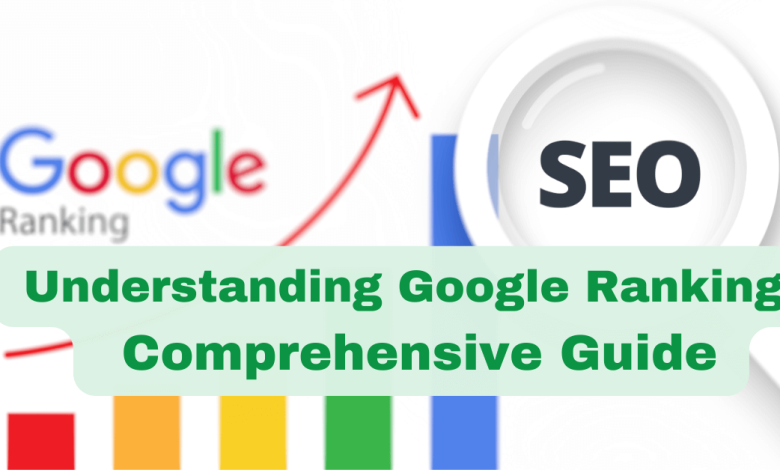Understanding Google Ranking Factors: A Comprehensive Guide
Stay ahead of the curve with the most up-to-date guide on Understanding Google Ranking. Discover the latest trends, tools, and techniques for SEO success in 2023.

Unlock the secrets of Google’s search algorithm. This comprehensive guide on Understanding Google Ranking Factors will help you optimize your website for better visibility.
In the digital age, where information is just a click away, Understanding Google Ranking Factors websites is crucial for businesses and individuals alike. Whether you’re a business owner looking to increase your online visibility or a curious individual wondering how Google decides what to show you, this guide is your one-stop resource. Buckle up as we delve into the intricacies of Google Ranking.
What is Google Ranking Factors?
Definition and Basics
Google Ranking Factors refers to the position that your website occupies in the search engine results pages (SERPs) for specific keywords. When you type a query into Google, the search engine uses a complex algorithm to determine which websites are most relevant to your search. The higher your website ranks, the more visibility it gets, leading to more clicks and potentially more business. Ranking Results – How Google Search Works
How It Affects Visibility Online
Understanding Google Ranking Factors is not just for tech-savvy individuals or digital marketers; it’s for anyone who has a website or plans to have one. A higher ranking means your website appears on the first page of Google search results, which is prime real estate. Studies have shown that websites on the first page receive almost 95% of web traffic, leaving only 5% for the remaining pages.
The Algorithm Behind Google Ranking Factors
Brief History of Google’s Algorithm Updates
Google’s algorithm has seen numerous updates since its inception. From the early days of simple keyword matching to the current complex machine learning algorithms, Google has come a long way. Some of the major updates include Panda, Penguin, and the more recent BERT, each aiming to provide more accurate and relevant search results.
Core Components of the Algorithm
Google uses over 200 factors in its algorithm, but some of the key components include:
- Relevance of content
- Quality of backlinks
- User experience metrics like click-through rate (CTR)
- Site speed
- Mobile-friendliness
Understanding these core components can give you an edge in optimizing your website for better Google Ranking Factors.
Importance of Keywords
Role of Keywords in Google Ranking Factors
Keywords are the building blocks of any SEO strategy. They are the words or phrases that users type into Google when looking for information. By optimizing your website for relevant keywords, you increase the chances of ranking higher in Google’s SERPs.
How to Choose the Right Keywords
Choosing the right keywords is a blend of art and science. You need to consider factors like search volume, competition, and relevance. Tools like Google Keyword Planner and SEMrush can provide valuable insights into keyword performance.
On-Page SEO Factors
Title Tags, Meta Descriptions, and Headers
When it comes to on-page SEO, the devil is in the details. Title tags, meta descriptions, and headers play a significant role in your Google Ranking Factors. A well-crafted title tag can not only improve your search ranking but also increase your click-through rate. Similarly, a compelling meta description can entice users to click on your link rather than a competitor’s. Headers, or H1, H2, and H3 tags, help Google understand the structure and content of your page, making it easier to rank.
Content Quality and Relevance
Google loves quality content. But what does ‘quality’ mean in this context? It means content that is well-researched, offers value to the reader and is free from grammatical errors. Relevance is equally important. Your content should be closely aligned with the keywords you are targeting. Irrelevant content can not only hurt your ranking but also turn away potential customers.
Off-Page SEO Factors
Backlinks and Their Importance
Backlinks, also known as inbound links, are links from other websites that point to your site. Google views these as votes of confidence in your content. However, not all backlinks are created equal. Links from reputable, high-authority websites carry more weight than links from low-quality sites.
Social Signals and User Engagement
While the impact of social signals (likes, shares, follows, etc.) on Google Ranking Factors is a topic of ongoing debate among SEO experts, there’s no denying that high user engagement rates are a positive indicator. Social media can be a powerful tool for increasing your website’s visibility and, by extension, its Google Ranking Factors.
Technical SEO
Site Speed
In today’s fast-paced world, nobody likes to wait. This is especially true for websites. A slow-loading site can severely impact your Google Ranking Factors. Google’s algorithm takes into account the speed of your website, making it a crucial factor for SEO.
Mobile-Friendliness
With the increasing number of mobile users, having a mobile-friendly website is no longer optional; it’s a necessity. Google’s mobile-first indexing means that the mobile version of your website is the one that will be used for ranking and indexing purposes.
Local SEO and Google Ranking Factors
Importance for Small Businesses
If you’re a small business owner, local SEO is your best friend. Optimizing your website for local searches can significantly improve your Google Ranking Factors in your local community. This is crucial for attracting customers to your brick-and-mortar store.
How to Optimize for Local Searches
Local SEO involves a range of strategies, from claiming your Google My Business listing to optimizing your website’s meta descriptions for local keywords. Reviews and ratings also play a significant role in local SEO, so encourage satisfied customers to leave positive reviews.
User Experience and Core Web Vitals
What are Core Web Vitals?
Core Web Vitals are a set of metrics that Google considers important for the overall user experience of a website. These include Largest Contentful Paint (LCP), which measures loading performance; First Input Delay (FID), which gauges interactivity; and Cumulative Layout Shift (CLS), which assesses visual stability.
How They Affect Google Ranking Factors
Starting from May 2021, Core Web Vitals have become a ranking factor in Google’s algorithm. This means that websites offering a better user experience will likely see an improvement in their Google Ranking Factors. If you’ve been neglecting the technical aspects of your site, now is the time to pay attention.
The Role of Content
Importance of Quality Content
Content is king, as the saying goes. High-quality, valuable content not only attracts more visitors but also encourages them to stay longer on your site. This increased engagement sends positive signals to Google, which can boost your ranking.
Types of Content That Rank Well
Different types of content can help improve your Google Ranking Factors. These include blog posts, long-form articles, videos, podcasts, and infographics. The key is to provide value to your audience while also keeping the content relevant to your target keywords.
SEO Tools for Understanding Google Ranking Factors
Overview of Popular Tools
There’s a plethora of SEO tools available to help you understand and improve your Google Ranking Factors. Some of the most popular ones include Google Analytics, SEMrush, and Ahrefs. These tools offer a range of features, from keyword tracking to backlink analysis.
How to Use Them Effectively
Using SEO tools effectively requires more than just a cursory glance at the dashboard. You need to dive deep into the data and analyze it to draw actionable insights. For instance, if you notice that a particular page has a high bounce rate, it might be worth investigating further to see what’s turning visitors away.
Common Myths About Google Ranking Factors
Debunking Misconceptions
The world of SEO is rife with myths and misconceptions. Some people believe that keyword stuffing will improve their Google Ranking Factors, while others think that SEO is a one-time task. This section aims to debunk some of these common myths.
What Actually Works
When it comes to improving your Google Ranking Factors, there are no shortcuts. What works is a well-thought-out SEO strategy that focuses on providing value to the user. This includes optimizing your on-page and off-page SEO, producing high-quality content, and continuously monitoring your performance.
How to Monitor Your Google Ranking Factors
Tools and Techniques
Monitoring your Google Ranking Factors is not a “set it and forget it” task; it requires ongoing effort. Various tools can help you keep tabs on your ranking, such as Google Search Console, Moz, and Rank Tracker. These tools can show you how your website ranks for specific keywords over time, allowing you to adjust your strategy as needed.
Importance of Regular Monitoring
Regular monitoring is crucial for several reasons. First, Google’s algorithm is continually evolving, which means your ranking can fluctuate. Second, your competitors are also optimizing their sites, which can affect your position. Regular monitoring allows you to stay ahead of the game and make timely adjustments to your SEO strategy.
Future Trends in Google Ranking Factors
AI and Machine Learning
Artificial Intelligence (AI) and machine learning are becoming increasingly important in Google’s ranking algorithm. These technologies allow Google to understand the context and semantics of a page better, leading to more accurate search results. Keeping an eye on these trends can give you a competitive edge.
Voice Search and Other Upcoming Trends
Voice search is another trend that’s gaining traction. With the increasing use of voice-activated devices like Google Home and Amazon Echo, optimizing for voice search is becoming more important. Other trends to watch out for include mobile-first indexing, video content, and the increasing importance of user experience factors.
Read on for more related articles on 50 Secret Google Ranking Factors for 2023, Make Easy to Rank.
What is Google Ranking Factors?
Google Ranking Factors refers to the position that a website occupies in Google’s search engine results for specific keywords. The higher the ranking, the more visibility the website gets.
How Can I Improve My Google Ranking Factors?
Improving your Google Ranking Factors involves a combination of on-page and off-page SEO strategies, including keyword optimization, quality content creation, and backlink acquisition.
Is Social Media Important for Google Ranking Factors?
While the direct impact of social media on Google Ranking Factors is still a topic of debate, there’s no denying that social signals can indirectly affect your ranking by driving traffic and increasing user engagement.
What are Core Web Vitals?
Core Web Vitals are a set of user experience metrics that Google considers important for ranking. These include loading performance, interactivity, and visual stability.
How Often Does Google Update Its Algorithm?
Google updates its algorithm frequently, with major updates happening several times a year. It’s crucial to stay updated on these changes to maintain or improve your ranking.
Can I Pay Google to Rank Higher?
No, Google’s organic search results cannot be influenced by payments. Google does offer paid advertising options like Google Ads, but these are separate from organic rankings.
Conclusion: Understanding Google Ranking is not just a technical endeavour but a critical aspect of modern business and personal branding. By paying attention to on-page and off-page SEO, keeping up with algorithm changes, and continuously monitoring your performance, you can improve your visibility online and achieve your goals.





